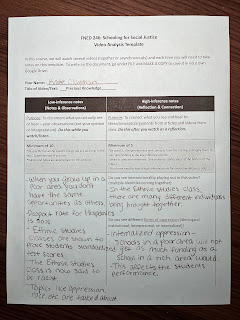1. "Disability only becomes a tragedy for me when society fails to provide the things we need to lead our lives - job opportunities or barrier free buildings" (Hehir 2).
I really liked this quote and it made me think about how having a disability isn't the issue. The real issue is how society reacts to people who struggle with certain disabilities. Society can be very ableist against people with disabilities. An example of ableism would be designing a building with no elevator or ramps for people in wheelchairs. That is sending a message to them that they are being discriminated against because there are no accessible forms of transportation for them to get where they need to be. This is also important to keep in mind if you're going into education. Say you have a visually impaired student, you wouldn't want to sit him/her in the back of the classroom because they won't be getting the information that they need. Instead, you would want to make sure that you sit them in the front of the class where they can see clearly.
2. "The
pervasiveness of ableist assumptions in the education of these children not
only reinforces prevailing prejudices against disability but may very well contribute to low levels of educational attainment and employment" (Hehir 4).
People are quick to assume that a person who struggles with a disability will not do very well in school based on the disability that they were born with. Children with disabilities are often placed in "special classrooms" where they do activities to work toward solutions that can help them. The time spent in these "special classrooms" takes away from the time needed to learn academic material. It can also make children feel isolated or different from others which can create a stigma.
3. "The fact that dyslexia has as
its main symptomatology the failure of children to learn to read, a primary
goal of education for all students, and that dyslexic children are not the only
children who struggle with reading means that explanations for this failure
go to the very structure of schooling" (Hehir 13).
Dyslexic children not being the only ones that struggle to read is a reflection of the type of education they are receiving. The structure in which children are taught can impact the way they learn. Teachers that lack the appropriate preparation to teach children successfully can also prevent students from learning the appropriate material. If a student is struggling to read or do a certain task, it is not always caused by a disability. It can also be because of the teacher or structure of the curriculum.
Reflection: Every child has the right to a good quality education and deserves to be included. My goal is to create an inclusive classroom for my students where they can feel safe. Some ways to create an inclusive classroom is by having different toys and books that show or explain different situations that some students may struggle with. It is also important to be aware of how ableism can show up in schools. I provided a link below that shares some tips for handling academic ableism.










